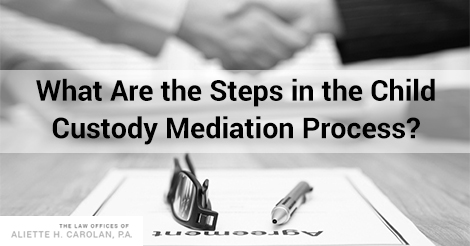 Child custody is a delicate subject for families and divorcing or legally separating couples. But not all child custody issues need to be dramatic and dragged through family probate court.
Child custody is a delicate subject for families and divorcing or legally separating couples. But not all child custody issues need to be dramatic and dragged through family probate court.
In fact, if you believe that you and your co-parent can come to an agreement about child custody, then you may be able to take advantage of the child custody mediation process.
Mediation has become increasingly popular because it allows for parents to make decisions outside of court while minimizing the costs, time, and headaches associated with going through litigation.
Custody issues are typically some of the most difficult to resolve, but a long as the child’s best interests are the ultimate end goal for all involved, then mediation could be the route for you.
Step 1: Agreeing to Mediate the Case
Both parties involved must be willing to work together in order to move into mediation. This can be extremely beneficial for you as well as your children, but both parents need to understand how mediation works.
Rather than preparing for court, mediation involves a neutral third party who is appointed to help direct the conversation. The mediator is not responsible for making a decision in your case. Rather, he or she is involved to foster the most effective communication environment for you and the other spouse.
Step 2: The Initial Child Custody Meeting
The first child custody mediation meeting will typically involve laying the ground rules for interacting with one another. In some cases, it does not work well for both parents to meet in the same room.
In this situation, the child custody mediator will shuttle back and forth between two different rooms in order to present ideas and options. Whatever is going to be most effective for you and the other party is likely to be used in mediation.
Mediation provides you the most freedom and flexibility when it comes to your final arrangement. This is one of the biggest benefits of using mediation to resolve child custody issues.
Step 3: Subsequent Meetings
In the first meeting, the initial contested issues will be discussed, but both parties may need to move forward by discussing essential concerns.
Some of these might include:
- Exceptions to the regular schedule like vacations and holidays
- The regular custody and visitation schedule
- The methods which you agreed to use to change the custody agreement in the future
- How parents will communicate with each other about issues associated with the children
The mediator will work with you to come up with a most effective resolution for your case in this situation, but he or she does not make any final decisions.
Also Read : How Mediation Can Save You Time and Money in Your Divorce
Step 4: Discussing Solutions
Issues may arise as you continue to work with the other parent but the mediator is there to help iron these out to come to an effective resolution as soon as possible.
The freedom and flexibility afforded by mediation give you more opportunities to compromise and come up with something that is most beneficial for your family.
Learn more about mediation here.
Step 5: Signing of the Custody Agreement
Once you have ironed out all the issues and come to an agreement on critical child custody concerns, you will need to sign the agreement. If you are unable to do this with the other party, then you will need to resolve your child custody issues in court.
Make sure that you understand that this agreement is a binding contract and it needs to reflect your accurate understanding of the custody arrangement that you have arrived at.
Child Custody Mediation with a Miami Family Law Attorney
Before you get too overwhelmed with the child custody and timesharing processes, do yourself a favor and discuss your situation with a Miami family law attorney.
An attorney will listen to your situation, your goals, and even review any agreements you may already have in place with your co-parent. Having this discussion with an attorney will help you to determine if mediation is right for you.
Visit here to learn more about mediation or to get started with a Miami family law attorney today.

